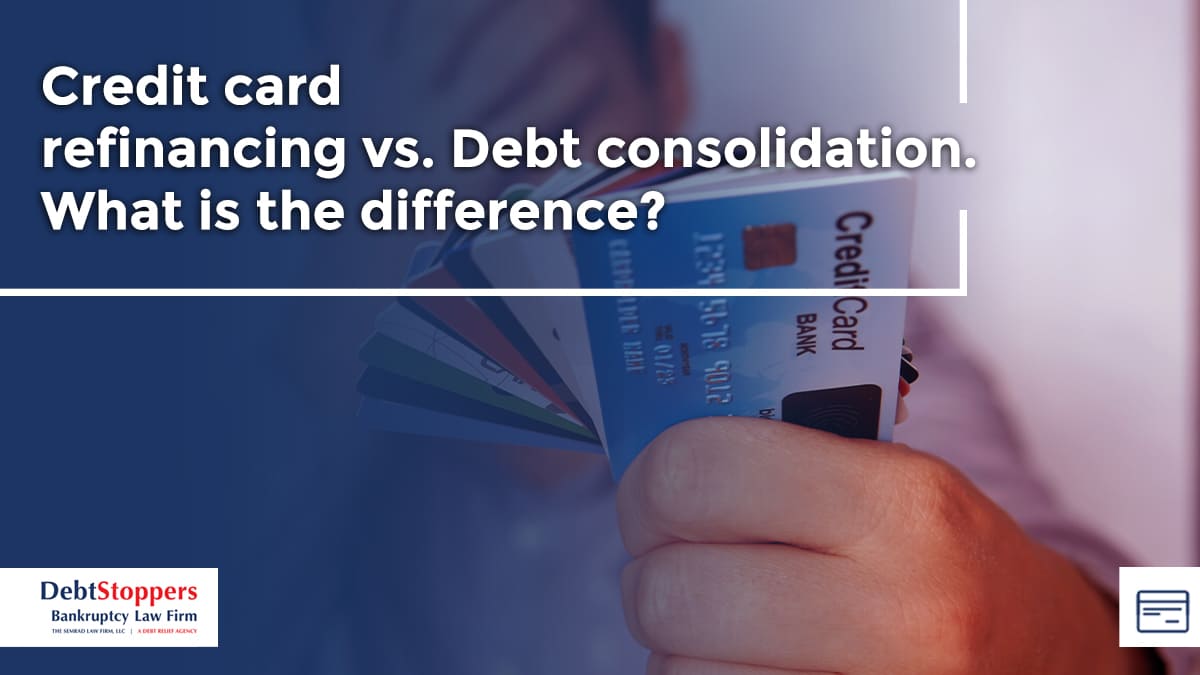Credit card refinancing vs. Debt consolidation. What is the difference?
Updated on 25 September 2025

Credit card refinancing and debt consolidation are both strategies for managing debt, but they involve different processes and outcomes.
Credit card refinancing specifically targets credit card debt and involves transferring the balances from one or more existing credit cards to a new credit card account. The primary goal of credit card refinancing is to reduce the cost of carrying credit card debt by securing a lower interest rate or promotional period with 0% APR.
Debt consolidation can encompass various types of debt, including credit card debt, personal loans, medical bills, etc. Debt consolidation involves combining multiple debts into a single loan or repayment plan. The primary goal of debt consolidation is to streamline debt repayment, simplify finances, and potentially reduce the overall cost of borrowing by securing a lower interest rate or more favorable repayment terms.
Both credit card refinancing and debt consolidation aim to simplify debt repayment and potentially reduce the cost of borrowing, but they employ different methods to achieve this goal. It's essential to understand the differences between the two and choose the approach that best suits your needs and financial goals.

What is credit card refinancing vs debt consolidation
Credit card refinancing and debt consolidation are both strategies for managing credit card debt, but they involve different processes and outcomes. Here's a comparison of credit card refinancing and debt consolidation.
Credit card refinancing
Credit card refinancing is also known as a balance transfer. Credit card refinancing allows you to transfer the balances from one or more existing credit cards to a new credit card account, typically with more favorable terms. The primary goal of credit card refinancing is to take advantage of lower interest rates, promotional offers, or better repayment terms to reduce the cost of carrying credit card debt.
Credit card refinancing can be a useful strategy for reducing the cost of credit card debt and paying off balances more efficiently. However, it is imporant to consider the terms and conditions of the new credit card, including interest rates, fees, and repayment terms, to ensure that refinancing is the right choice for your financial situation. Additionally, it is also important to avoid accumulating new debt on the new credit card and focus on paying off the transferred balances to achieve long-term financial stability.
Debt consolidation
Debt consolidation is a financial strategy that combines multiple debts, such as credit card balances, personal loans, or medical bills, into a single loan or repayment plan. The primary goal of debt consolidation is to streamline debt repayment, simplify your finances, and potentially reduce the overall cost of borrowing by securing a lower interest rate or more favorable repayment terms.
Debt consolidation can be an effective strategy for managing multiple debts and reducing the financial burden of high-interest debt. However, it is essential to carefully consider the terms and conditions of the consolidation method you choose and make a plan to repay the debt responsibly to achieve long-term financial stability.
What is the difference between credit card refinancing and debt consolidation?
The main difference between credit card refinancing vs debt consolidation is that credit card refinancing specifically targets credit card debt and debt consolidation can be used for other types of debt as well.
Additionally, credit card refinancing simply transfers the balance from one credit card to another credit card with more favorable terms. On the other hand, debt consolidation typically involves securing a personal loan.
What Are the Pros of Credit Card Refinancing?
The pros of credit card refinancing include saving money, low or no interest charges during an introductory period, and the ease of refinancing your debt.
Save money
One of the primary reasons for refinancing credit card debt is to secure a lower interest rate. By transferring balances to a credit card with a lower APR (Annual Percentage Rate), you can reduce the interest you pay over time. This means more of your monthly payments go toward paying down the principal balance rather than interest charges, allowing you to pay off the debt faster and save money in the long run.
If you're currently carrying balances on credit cards with high penalty APRs triggered by late payments, refinancing can help you avoid these penalty rates. By transferring balances to a new card with better terms, you can prevent your interest rates from skyrocketing due to late payments.
Overall, credit card refinancing can save money by reducing interest rates, taking advantage of promotional offers, simplifying payments, avoiding penalty rates, and reducing total interest costs over time. However, it's essential to carefully consider the terms of the new credit card and have a plan to repay the debt and maximize your savings.
No interest charges
Many credit card issuers offer promotional periods with 0% APR on balance transfers for a certain timeperiod. During this promotional period, you can pay off your transferred balances interest-free, and save money on interest charges entirely during that time.
By taking advantage of promotional periods, you can reduce the total amount of interest you pay over the life of the debt. This can result in significant savings, especially if you pay off the transferred balances before the promotional period ends.
Easy Refinancing
Credit card refinancing can be relatively easy for people with good credit with access to attractive balance transfer offers. However, it's essential to consider factors such as credit score, credit history, fees, and available offers to determine the ease and suitability of refinancing.
Your credit score plays a significant role in determining your eligibility for credit card refinancing. Generally, people with higher credit scores are more likely to qualify for lower interest rates and better balance transfer offers.
The availability of attractive balance transfer offers can impact the ease of credit card refinancing. Lenders periodically introduce promotional deals, such as 0% APR balance transfer offers for a limited time. If you come across a compelling offer that aligns with your financial goals, the refinancing process may be relatively straightforward.
While balance transfer offers can provide savings on interest charges, many credit cards impose balance transfer fees, typically ranging from 3% to 5% of the transferred amount. These fees can add to the cost of refinancing and affect its overall ease, particularly if they're substantial.

What Are the Pros of Debt Consolidation?
Debt consolidation can be an effective strategy for managing multiple debts and achieving financial stability. Some of the pros of debt consolidation include a simplified repayment process, lower interest rates, fixed monthly payments, and/or a shorter repayment period.
Low interest rates
Debt consolidation can potentially lower the overall interest rate on your debts, especially if you consolidate high-interest credit card debt into a lower-interest loan. By reducing the interest rate, you can save money on interest charges over the life of the loan, allowing you to pay off the debt more quickly.
Fixed monthly payments
Debt consolidation loans typically come with fixed repayment terms, meaning you'll have a set monthly payment amount and a specific timeline for paying off the debt. This predictability can make it easier to budget and plan for the future, as you'll know exactly how long it will take to become debt-free.
Short repayment period
Debt consolidation can potentially lead to a shorter repayment period but this isn't always the case. Whether debt consolidation results in a shorter repayment period depends on several factors, including the terms of the consolidation loan or repayment plan, your financial situation, and your ability to make consistent payments.
If you consolidate high-interest debts into a consolidation loan with a lower interest rate, more of your monthly payments will go toward reducing the principal balance rather than paying interest. As a result, you may be able to pay off the debt more quickly, leading to a shorter repayment period.
Additionally, debt consolidation loans typically come with fixed repayment terms, such as a specific number of months or years to pay off the loan. By having a set repayment timeline, you're motivated to make consistent payments and pay off the debt within the specified period, potentially leading to a shorter repayment period.
If you're able to consolidate your debts into a single loan with a manageable monthly payment, you may choose to pay more than the minimum required each month. By making higher monthly payments, you can accelerate the repayment process and pay off the debt more quickly, shortening the repayment period.
Which option is safer if you are close to bankruptcy: Refinancing or debt consolidation?
If you are considering bankruptcy, you may also be curious to know which option is safer: refinancing or debt consolidation. If you are considering either, it’s important to understand the differences between them and understand and how they can impact your bankruptcy.
In general, if you are close to bankruptcy, debt consolidation is generally a safer option than refinancing. However, for debt consolidation to be a realistic option, you’ll need to apply and qualify for a new loan or line of credit with better terms.
Refinancing is typically considered the riskier option because if you decide to file for bankruptcy, recent refinancing can complicate the bankruptcy process and may be viewed by the bankruptcy court as suspicious.
It’s important to assess your debt and ability to pay accurately and honestly. If you still won’t be able to afford your debt even with a lower interest rate, bankruptcy may be the better option.
How can a debt consolidation lawyer protect your rights?
An experienced debt consolidation lawyer can protect your rights in several ways. Your attorney can negotiate with your creditors on your behalf. An attorney may be able to negotiate a deal to reduce the amount you owe or make the repayment terms more manageable.
Perhaps most importantly, if you are sued over your debt, an experienced debt consolidation lawyer can represent you in court.
Additionally, if you are being harassed by creditors, a consumer protection lawyer can stop the abusive tactics and ensure your rights are protected.
How can Debtstoppers help you with credit card refinancing and debt consolidation?
If you are struggling to manage your debt, the experienced attorneys at Debtstoppers can provide valuable assistance with credit card refinancing and debt consolidation in several ways.
-
Legal Advice and Guidance - Our attorneys can assess your financial situation, including your debts, assets, income, and expenses, and provide personalized legal advice on the most suitable debt relief options for your circumstances. We can explain the pros and cons of credit card refinancing, debt consolidation, and other alternatives, helping you make informed decisions about how to manage your debts effectively.
-
Evaluation of Bankruptcy Options - If your financial situation is severe and other debt relief options are insufficient, Debtstoppers can evaluate whether bankruptcy is a viable solution for your debts. Our experienced attorneys can explain the different types of bankruptcy, such as Chapter 7 and Chapter 13, and help you understand the eligibility criteria, benefits, and consequences of each option.
-
Assistance with Bankruptcy Proceedings - If you decide to pursue bankruptcy, Debtstoppers can guide you through the entire bankruptcy process, from preparing and filing the necessary paperwork to representing you in court hearings and negotiations with creditors. We can ensure that your rights are protected and help you navigate complex bankruptcy laws and procedures.
-
Negotiation with Creditors - Our team of bankruptcy attorneys can negotiate with creditors on your behalf to obtain more favorable terms for credit card refinancing or debt consolidation. The attorneys at Debtstoppers can advocate for lower interest rates, reduced balances, waived fees, or extended repayment periods, helping you achieve a more manageable and affordable debt repayment plan.
-
Legal Protection - Working with a bankruptcy attorney can provide legal protection and representation in case of disputes or legal issues related to credit card refinancing or debt consolidation. Debtstoppers can review loan agreements, contracts, and other legal documents to ensure that your rights are protected and that you understand the terms and conditions of any debt relief arrangement.
-
Financial Counseling - In addition to legal assistance, Debtstoppers offers financial counseling and budgeting advice to help you improve your financial literacy, manage your finances more effectively, and avoid future debt problems. We can provide practical strategies for budgeting, saving, and rebuilding your credit after bankruptcy or debt consolidation.
Debtstoppers has helped thousands of people with credit card refinancing and debt consolidation. Our team of attorneys can help you navigate the complexities of credit card refinancing, debt consolidation, and bankruptcy, guiding you toward the best possible outcome for your financial situation. Whether you're seeking to restructure your debts, eliminate them through bankruptcy, or explore alternative solutions, a knowledgeable and experienced attorneys at Debtstoppers can provide valuable support and advocacy every step of the way.





